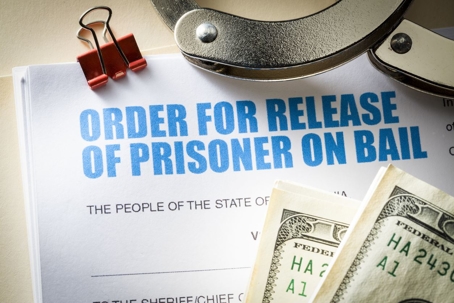Mississippi is set up to where a person who is charged with a crime is entitled to a reasonable bail, with very few exceptions. But what is bail? Bail is just another way of saying bond or conditions of pretrial release. The entire point of a judge setting up a bond or conditions of pretrial release really serves two purposes: 1) to make sure that a person shows up for all court hearings (including trial), and 2) to ensure that the person will not be a danger to himself or others if they are released before trial.
Once a person is arrested, they should usually be taken before a judge for an initial appearance. At the initial appearance, the person will be told what they have been charged with, and the judge should set a reasonable bond. But what exactly is a reasonable bond? Luckily, Mississippi has what is known as the Mississippi Rules of Criminal Procedure, which explain that when a person is entitled to a bond (which most people are), the judge should use the least restrictive bond. Under the rules, that usually means that a judge SHOULD release a person on their own recognizance (without having to pay anything) before they consider more restrictive means, such as requiring the person to get a bondsman, placing the person on an ankle monitor, etc. Unfortunately, though, most judges and many lawyers do not understand the criminal rules, and as a result, many people accused of crimes end up spending a lot of money on a bondsman when they should not have had to even get one.
For example, let’s say that a person is arrested for aggravated assault. That person has no prior criminal history, and this charge is their first one. They are taken before a judge for their initial appearance, and instead of reviewing the rules and following them, the judge will usually set bond between $25,000 to $50,000, if not more. The judge did not consider any other terms of pretrial release nor consider releasing the person on their own recognizance. While that person may bond out relatively quickly, the harsh reality is that the judge may have just imposed excessive bail by not following the rules, which is unconstitutional.
Now let’s change the facts a little bit. Suppose the person has a few prior convictions for aggravated or simple assault. Once the person goes before the judge, there is a weaker argument that the person should be released on their own recognizance, which means that the judge is in a stronger position to set an actual bond.
But this raises another question: is every person charged with a crime automatically entitled to a bond? The answer is no. Not all of those charged are indeed entitled to bail or pretrial release. Mississippi’s constitution explains that if a person is arrested for a capital crime (a crime where the maximum penalty is the death penalty), then the person may not be eligible for pretrial release. Even then, whether such a person may be entitled to a bond depends on the amount of evidence that the prosecution has against the person.
Another exception is if the person was already out on a felony bond. If a person is out on a felony bond and then catches a completely new charge, the first bond can be revoked, which means that the person will likely remain in jail until one of the two cases is resolved. In this situation, a lot of justice and city court judges often think that just because a person may have a new charge, then they are automatically ineligible for a bond. The key, though, is whether the first bond has been revoked. If the first bond has not been revoked, then the judge on the second charge can still set bond and the person may still be released, at least until a judge revokes the first bond.
To muddy up the waters, even more, let’s say that a person catches a felony charge while they were already released on probation. That person may be entitled to a bond, but it is not unusual for a judge to not issue one because the Mississippi Department of Correction has a hold on the person. In that situation, ideally, a lawyer would still argue that bond should be set. Why? For two reasons. First, even though MDOC may have a hold on the person, a probation officer may still lift the hold and not revoke the person’s probation until the new matter is resolved. Second, even if MDOC does revoke the person’s probation right away, setting bond right then and there means that the person will not have to wait to come back before the judge for a bond later once he has finished serving his time.
As you can tell, there are many situations that pop up concerning bond, but the ones discussed above are the typical situations that people encounter. Every case is different. The important thing is making sure that you or your lawyer have a clear understanding of the rules and how bail works, especially since that knowledge can mean the difference between being released before your trial and staying in jail for weeks, months, or even years before the case is resolved.
